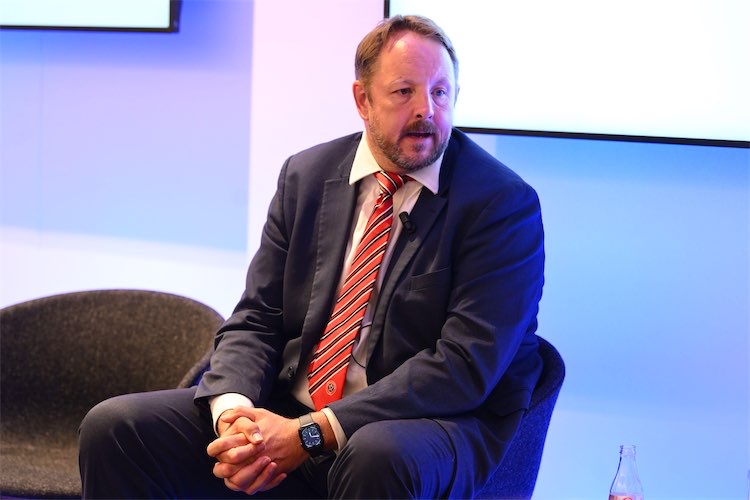Committee Chair Says Finding Money For Climate Goals Will Be Biggest Challenge For COP29
Simon Stiell, United Nations climate chief, spoke at the opening session of COP29 in Baku, Azerbaijan (Alamy)
5 min read
Chair of the Environmental Audit Committee, Toby Perkins, has said that money will be the biggest challenge for governments in the COP29 climate summit, at a time when there are “huge alternative uses for public money”.
The Labour MP for Chesterfield told PoliticsHome that the new Labour government was so far “putting its money where its mouth is”. However, he said finding the money to fund climate commitments would be the key challenge for the UK government heading into the United Nations Climate Change Conference (COP29) this week.
Donald Trump’s victory in the US presidential election casts a shadow over this year’s COP, as the billionaire president-elect is a known climate sceptic. Several major world leaders will not be attending the summit, including current US President Joe Biden, and the leaders of China, France, Germany, India, and the European Commission.
Perkins, who was elected as chair of the EAC in September, said Britain therefore needed to play a “really important global role”.
“The UK Government needs to go in there with real determination,” he said.
“I think they've got a strong story to tell about steps that the government's currently taking and in terms of our relationship with allies. At a time when many Western nations have a variety of different things to spend money on, I think it's important that we're able to look other nations in the eye and talk about what we're doing, and also try and make sure we bring them to the table successfully.”
Perkins said that while he did not want to “pre-judge” what changes could be made to climate commitments under Trump’s presidency, “everyone will be watching [the USA’s] contribution to COP29 with great interest” and the UK’s relationship with America would be “crucially important”.
As the new chair of the EAC, Perkins said he would keep holding the government to account and demand they keep climate issues at the top of the agenda: “It's not allowed to become a secondary issue.”
According to Perkins, this country is “uniquely placed” to take leadership on global climate issues because of the strength of the UK financial sector to “create markets that bring private finance into the battle to keep global temperatures below a 1.5 degree increase”. In his view, science and innovation would be another key area for the UK to focus on.
“We all recognise that governments alone aren't going to finance the investments we need,” he continued.
“We also need to make sure that we absolutely get bang for the taxpayer's buck. It's important that every bit of government money that is spent is spent as prudently and wisely as possible, and really delivers the change that we need.
“We need to recognise that that is happening at a time when there's huge alternative uses for public money, like the National Health Service, like the war in Ukraine, like supporting people with the cost of living and our crumbling national infrastructure. So far, the government's made some positive steps, but there is still a huge amount to do.”
 Toby Perkins was first elected Labour MP for Chesterfield in 2010 (Alamy)
Toby Perkins was first elected Labour MP for Chesterfield in 2010 (Alamy)
Perkins said he was “disappointed” in the lack of progress made at the UN Biodiversity Summit (COP16) which took place last week. Two years ago, the previous Biodiversity Summit set out goals for halting and reversing nature loss, with the hope being that this year’s summit would focus on delivery.
But the summit was suspended without agreement on the financial arrangements from major Western economies to poorer countries that contain some of the most biodiverse environments, such as the Amazon rainforest in South America.
“My sense was that the UK Government went there with determination to try and get an agreement, and so I think it is disappointing that ultimately, that agreement wasn't reached,” Perkins said.
“Ahead of COP29 it is a retrograde step for global cooperation that the COP16 ultimately failed on one of the key tests that I think many people had set for it.”
He added that he would like to see ministers address this failure in the House of Commons, as well as pointing out the progress made on agreeing a deal on Digital Sequence Information (DSI) to make genetic information sequenced from the natural world available online, and the publication of new criteria to meet targets to protect 30 per cent of land and ocean by 2030 in England.
“Ultimately, it's important that we say in the UK Parliament that this is a national priority, that the government is taking steps internationally to try and ensure that the wealthier nations make their contribution to some of those guardians of global treasures like the rainforest,” Perkins said.
“The fact that there wasn't a statement on the floor of the House undermines the importance of what I believe was an important summit.”
There are several outstanding EAC reports from the last Parliament that the government has yet to respond to, including on carbon budgets, decarbonising shipping and decarbonising the electricity grid.
The EAC has sent letters reminding ministers of these reports, with Perkins saying “they still owe us answers”.
“Just because the ministers and the government have changed doesn't mean that the issues have.
“It would be good to think that the issues that have been raised mean this government is taking action on them. But even if they're not, they need to front up and tell us that. The previous government should have responded. They didn't. We just need to remind this government that that response is still required.”
Going forward, the EAC is likely to also focus on issues around planning, flooding, the Global Ocean Treaty, and soil science.
